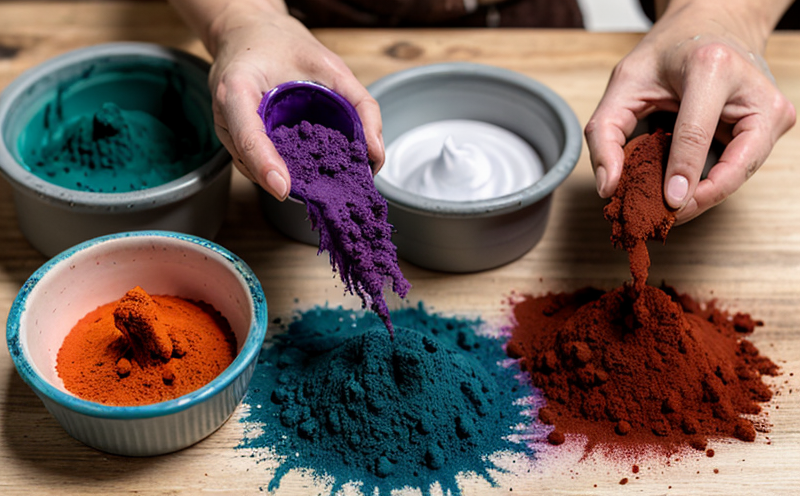Polyester Fabric Dye Testing
The testing of dyes used in polyester fabric is a critical process that ensures product quality and compliance with international standards. Polyester fabrics are widely used across various sectors, including fashion, upholstery, and industrial textiles due to their durability, washability, and resistance to shrinking. However, the performance of these fabrics heavily depends on the dyeing process, which can vary significantly based on factors such as fabric type, dye type, and environmental conditions.
Dye testing in polyester fabric involves a series of rigorous procedures aimed at evaluating various properties of the dyed material. These tests are essential for ensuring that the finished product meets both aesthetic and functional requirements set by industry standards. The primary goal is to assess the colorfastness, light fastness, and overall quality of the dye used on polyester fibers.
The testing process typically begins with a thorough sample preparation step where the fabric is cut into standard sizes according to ISO 13938-1:2017. This ensures that all samples are consistent in size and shape for accurate measurement. The chosen dyes must also adhere strictly to international standards such as ISO, ASTM, or EN specifications to ensure compatibility with global markets.
The first step after sample preparation is the immersion of fabric strips into dye baths under controlled conditions. Here, temperature, pH levels, and time are meticulously regulated based on the specific dye being tested (ISO 105 C02:2021). After immersion, the samples undergo rinsing to remove excess dye, followed by drying in a climate-controlled environment to simulate real-world usage.
Following this, colorfastness testing is conducted using various methods. One common method involves placing fabric strips into a washing machine with detergents and water at specific temperatures (ASTM D6123:2019). Another approach uses accelerated weathering equipment like xenon arc lamps to simulate sunlight exposure over time (ISO 105 B02:2014). These tests help determine how well the dye will resist fading due to washing and UV light.
Additionally, there are specific tests designed to evaluate other important properties such as fastness to rubbing. This is typically done using a standardized rubbing apparatus where fabric strips are rubbed against white cotton cloth (ISO 105 E02:2021). The results indicate whether the dye remains intact during normal wear and tear.
The entire process culminates in detailed reporting that includes all test results along with recommendations for improving any shortcomings identified. This comprehensive approach ensures high-quality products that meet stringent industry standards, thereby enhancing customer satisfaction and brand reputation.
| Test Method | Description | Purpose |
|---|---|---|
| ISO 105 C02:2021 - Colorfastness to Washing | Simulates the effects of domestic washing on color retention. | Evaluates resistance to fading from cleaning. |
| ASTM D6123:2019 - Accelerated Weathering | Replicates long-term exposure to sunlight and moisture. | Determines stability against UV radiation and water. |
The data collected from these tests provides valuable insights into the performance characteristics of polyester fabric dyes, ensuring that manufacturers can make informed decisions regarding their production processes. By adhering strictly to international standards and employing advanced testing techniques, laboratories like Eurolab can deliver accurate, reliable results that contribute significantly towards maintaining quality control in the textile industry.
Benefits
Polyester fabric dye testing offers numerous advantages beyond mere compliance with regulatory requirements. One significant benefit is improved product longevity and consumer satisfaction. By ensuring that dyes used on polyester fabrics maintain their color over extended periods, manufacturers can extend the life cycle of their products, reducing waste and enhancing customer trust.
- Enhanced durability
- Better resistance to fading
- Increased reliability in performance across different environments
- Promotion of sustainable practices by minimizing resource consumption
From a business perspective, consistent dye quality translates into reduced returns and higher sales. Customers appreciate products that look good even after repeated washings or exposure to sunlight. Moreover, adhering to strict testing protocols can open doors to international markets where stringent quality standards are enforced.
In terms of R&D efforts, thorough dye testing allows companies to innovate without compromising on safety or efficacy. It enables them to explore new combinations of dyes and fabrics while ensuring that any changes do not affect the overall performance negatively.
Eurolab Advantages
At Eurolab, we pride ourselves on providing top-tier dye testing services tailored specifically to meet the needs of our clients in the textile industry. Our team comprises highly experienced chemists and technicians who possess deep expertise in color science and material analysis.
We utilize state-of-the-art instrumentation from reputable manufacturers like Konica Minolta, HunterLab, and BYK Gardner. These tools enable precise measurements and accurate interpretations of test results. For instance, our spectrophotometers allow us to capture detailed spectra of dyed fabrics, helping us identify even the slightest variations in color composition.
Our facilities are equipped with a wide range of equipment necessary for comprehensive dye testing, including but not limited to washing machines, weathering chambers, and abrasion testers. These resources ensure that every aspect of fabric dye performance is thoroughly examined.
We understand the importance of confidentiality when dealing with proprietary information. Therefore, all our operations are conducted in strict adherence to GDPR guidelines, guaranteeing secure handling of sensitive data provided by our clients.
Use Cases and Application Examples
Dye testing plays a crucial role across several applications within the textile industry, particularly for polyester fabrics used in clothing, home furnishings, and industrial products. Here are some key use cases:
- Clothing Manufacturing: Ensuring that garments retain their vibrant colors throughout washing cycles.
- Home Textiles: Guaranteeing that curtains or upholstery withstand exposure to sunlight without fading.
- Industrial Applications: Maintaining the appearance of protective clothing and workwear under harsh conditions.
| Industry Segment | Test Focus | Outcome |
|---|---|---|
| Clothing Manufacturing | Colorfastness to washing, light fastness | Durable and long-lasting products that meet consumer expectations. |
| Home Textiles | Light fastness, weathering resistance | High-quality materials that enhance aesthetics and durability. |
| Industrial Applications | Weathering resistance, abrasion testing | Protective gear that maintains its protective properties over extended periods. |





